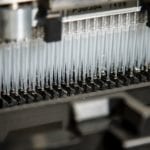The British Parliament has taken the first step towards legalizing the creation of children with three genetic parents. The process involved, cytoplasmic transfer, was developed to treat disorders of mitochondria. Mitochondrial diseases are inherited through the mother, leading to miscarriage, or debilitating disease and early death. It is estimated to affect around 1 in 3000-5000 people in the UK. According to Prof Doug Turnbull from The University of Newcastle, “We can treat the symptoms. We can improve the quality and length of peoples’ lives but we can’t cure them.”
Mitochondria are the ‘powerhouse’ of the cell. They float around in the cell cytoplasm and provide the energy needed for normal cell function. Mitochondria have a small amount of DNA passed down by the mother, which is separate from the nuclear DNA passed equally from the mother and father. In order to avoid using the mitochondria of an affected mother, healthy donated cytoplasm from an egg or embryo is used to replace the cytoplasm she produced, which also passes on the donor’s mitochondrial DNA. Hence an embryo is created through IVF with DNA from three adults – two women and a man.
This is not a completely new technology. Cytoplasmic transfer was pioneered in the late 1990s by Dr Jacques Cohen at the St Barnabus Institute in New Jersey, US. It is thought that around 30 to 50 children were born worldwide using the technique before the FDA asked clinics to stop doing cytoplasmic transfer in 2002 due to safety and ethical concerns. No long-term follow-up has been done on children born through cytoplasmic transfer, but there were problems with some of the early births and animal research has revealed abnormalities developing from the procedure.
Public debate around this unprecedented move has been fierce. Legalisation of cytoplasmic transfer would make the United Kingdom the first country in the world to permit ‘germ line’ genetic modification. This means a change in the genetic code of a human being which could be passed on through inheritance, permanently changing the human gene pool. Because it has not been done before, we don’t know what the outcome could be. While our genetic knowledge is increasing exponentially, there is still much we don’t know. While it would seem logical to think that to remove faulty mitochondrial DNA could only be a good thing, we also know that the gene for sickle cell disease is protective against malaria – removing genes can have negatives as well as positives – with our current knowledge, we can’t be sure of the final outcome.
Supporters point to the pain and suffering of those living with this terrible problem. Theoretical risks are disregarded in light of the high chance of success in allowing the birth of unaffected children. Public ethical and safety reviews have been conducted to their satisfaction, and they have members of families who have experienced the hardship of living with mitochondrial disease to campaign for the cause who, understandably, rouse our compassion.
Some people just think a child with three genetic parents sounds weird. This is what is known as the ‘yuck’ factor in bioethics. And its presence may be what ultimately helps us determine the best way forward. In his essay, ‘The wisdom of repugnance’ Bioethicist Leon Kass famously wrote about the introduction of human cloning, that when we feel unease on first hearing about a new technology, we should stop and consider what it is that makes us feel that way, before the familiarity of the idea makes us comfortable again. Public reaction to human cloning has had an impact on research programs – we can make a difference when we demand researchers consider community ethical standards.
So what is the basic problem? That the human embryo from which donated cytoplasm is taken will die, and if life begins at fertilization, this is wanton destruction of early human life? That the procedure itself has not passed the normal regulatory processes which are usually demanded before a medical procedure is approved as safe for humans? That meddling with the gene pool could create problems unforeseen by our limited vision? With the introduction of donated eggs and sperm for IVF we have really already moved away from two-parent families.
And the good old scientific imperative says – what can be done should be done. I don’t agree. I see the suffering and I do empathise but cytoplasmic transfer bothers me.
I will leave you with the words of Leon Kass: ‘in this age in which everything is held to be permissible so long as it is freely done, in which our given human nature no longer commands respect, in which out bodies are regarded as mere instruments of our autonomous rational wills, repugnance may be the only voice left that speaks up to defend the central core of our humanity.Shallow are the souls that have forgotten how to shudder’.

















